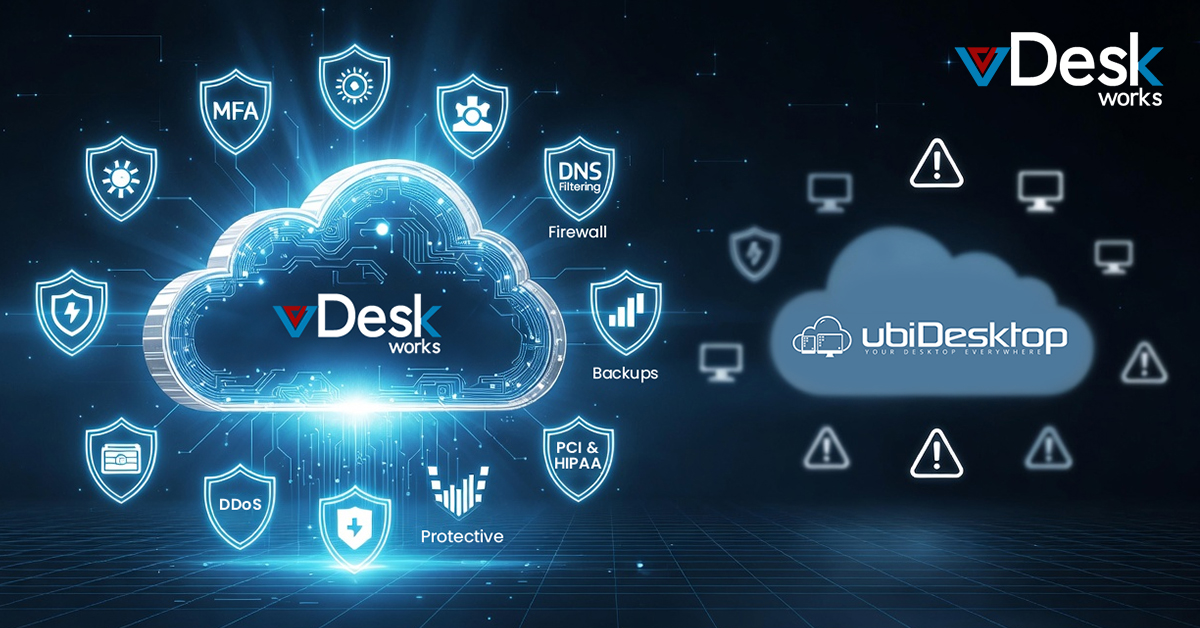The cloud technology market is expected to continue to grow throughout the decade. At the beginning of 2020, the COVID-19 pandemic caused businesses across the globe to adopt remote working models. Even as pandemic restrictions have been lifted and in-person gatherings have resumed, some companies still allow their employees to work remotely. For this reason, many businesses have started using virtual desktop infrastructure (VDI) solutions.
VDI solutions are virtualization frameworks that enable users to host digital resources like virtual machines on a central cloud server. The server can be accessed from any device. VDI as a service has proved helpful for businesses of all sizes and industries. In this blog post, we will go over the features and benefits of deploying VDI as a service. Let's get started!
Features of VDI as a Service
Some significant features that VDI solutions can offer companies include disaster recovery plans, file sharing, and remote access. These features will be explained in more detail below.
1. Disaster Recovery Plans
One significant feature that VDI solutions have are disaster recovery plans. Disaster recovery plans ensure that users can back up and restore data in the case of an event like a power outage or cyberattack. After the event, users can log back on to the system and resume working where they left off. Managers and administrators can adjust the frequency at which data backs up. Using VDI for disaster recovery allows for data to be recovered more quickly than on traditional desktop computers.
2. File Sharing
Another feature that most VDI providers include is easy file sharing. Users can effortlessly share important files and documents with colleagues and clients. This feature makes it easier for employees to collaborate on projects.
Benefits of VDI as a Service
There are several significant benefits to using VDI solutions. These benefits include increased security, allowing for more mobility and flexibility, increased productivity, reduced costs, centralized management, and increased scalability. The benefits will be explained in more detail below.
1. Increased Security
One of the main benefits of using VDI solutions is that they offer increased security. Many VDI solutions offer security features such as multi-factor authentication (MFA), protection against malware and viruses, and compliance with PCI-DSS and HIPAA regulations. Furthermore, only authorized users are allowed to access the central cloud server. If a device is affected by malware, disaster recovery plans allow users to recover their data from the previous backup. Company managers or administrators can set the frequency of backups to fit the organization's needs.
2. Increased Mobility and Flexibility
Another major benefit of using VDI solutions is that they offer increased mobility and security. Most VDI systems can be accessed on any device and operating system. Therefore, users can access their files and data from any of their devices. This increased flexibility makes it easy for remote employees to work on tasks with colleagues that are located in another city, state, or country. When companies use VDI solutions, they can be more agile.
3. Increased Productivity
When companies use VDI solutions, it can lead to increased productivity. VDI solutions increase productivity because employees can work from anywhere without downtime.
4. Reduced Costs
Another benefit of using VDI solutions is that they offer reduced costs. Since users can access their data and files on any device, this reduces the need for the organization to supply devices to each employee. By using VDI solutions, businesses can have BYOD (bring-your-own-device) environments. Also, some VDI providers like vDesk.works have remote desktop support services to handle any technical difficulties that might arise. The company won't need an extensive IT team in the office to handle these concerns, which in turn, saves the company more money.
5. Centralized Management
Companies should also use VDI solutions since they offer centralized management. Through a VDI system, company managers gain access to a centralized dashboard that allows them to view user activity and server health. This information allows managers to know how productive employees are each day.
6. Increased Scalability
Organizations using VDI solutions can scale up or down as needed. Scalability is adding or removing users, devices, or software licenses from the central cloud server according to the company's needs. Scalability is helpful for companies that hire new employees on a seasonal basis. Scalability is also helpful for companies that go through frequent turnovers or rely on temp workers.
Potential Downsides of Using VDI Solutions
While there are many benefits to using VDI solutions, there are some potential downsides that companies should keep in mind. Some companies may have endpoint security concerns when it comes to VDI. However, the event of a VDI data center being hacked is extremely rare. Also, if managers are concerned about local workstations falling victim to cyberattacks, they can invest in thin client workstations to further protect the data. Overall, the benefits of using VDI solutions outweigh any potential concerns businesses may have.
As remote ad hybrid work environments continue to be a part of the business world, companies should adopt VDI solutions. There are many benefits to using VDI solutions, such as increased security, increased mobility and flexibility, increased productivity, reduced costs, centralized management, and increased scalability. Company managers should look for a VDI provider that includes features like disaster recovery plans and file-sharing capabilities.
If companies want the best VDI as a service provider, they should use vDesk.works. vDesk.works has been a leading provider of VDI solutions to companies of all sizes and industries since 2014. For more information on vDesk.works, visit https://vdeskworks.com to speak with a product representative and receive a live demo.


 Emma Carson
Emma Carson
















